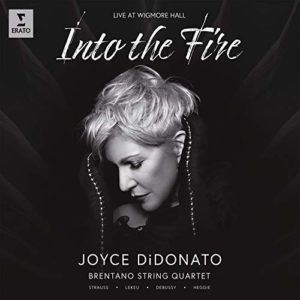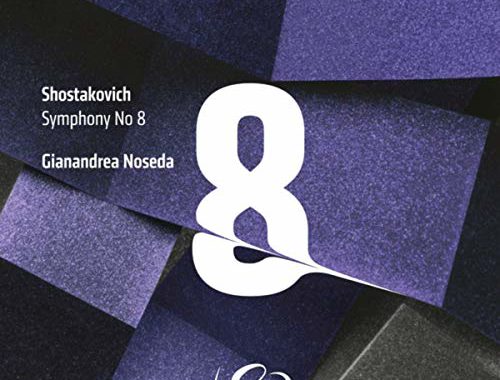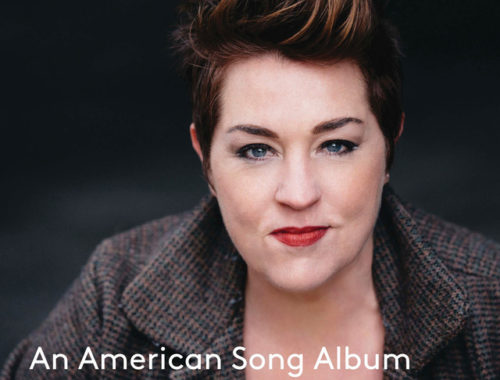GRAMOPHONE Review: Into The Fire – Joyce Di Donato/Brentano String Quartet (Live at Wigmore Hall)
 As if anyone needed reminding that Joyce DiDonato is nothing if not an intuitive stage animal, each of her recital projects are now carefully conceived as pieces of theatre in themselves, song choices shrewdly weighed and tested for their collective and accumulative effect. For this live Wigmore recital (which I imagine was repeated internationally) all paths lead to Jake Heggie’s dramatic song-cycle Into the Fire (written for her and the Alexander String Quartet back in 2012) with preceding choices establishing tangential themes, common links, and an assortment of moods.
As if anyone needed reminding that Joyce DiDonato is nothing if not an intuitive stage animal, each of her recital projects are now carefully conceived as pieces of theatre in themselves, song choices shrewdly weighed and tested for their collective and accumulative effect. For this live Wigmore recital (which I imagine was repeated internationally) all paths lead to Jake Heggie’s dramatic song-cycle Into the Fire (written for her and the Alexander String Quartet back in 2012) with preceding choices establishing tangential themes, common links, and an assortment of moods.
Most strikingly DiDonato and her collaborators here – the Brentano String Quartet – carry the colour of voice and string quartet through the recital via familiar Strauss arranged Mark Steinberg and Misha Amory (violinist and violist of the Brentano four) and Debussy – Trois chansons de Bilitis – arranged Heggie himself. And the highest compliment I can pay all three of the arrangers is that it sounds like those songs were conceived and swathed this way all along.
Strauss’ Die Nacht is more of a shroud, it has to be said, DiDonato receding into its mystery and apprehension through an ever whitening sound. Wigmore encourages intimacy in her Strauss, her departure into ‘the land of love’ at the close of Traum Dutch die Dammerung (Dream in the Twilight) magically invoking the ‘soft blue light’ which is all but visible in the closing chords.
But whose decision was it to retain applause at this point (?) where for the purposes of home listening a natural and breathtaking segue could have been achieved from the Strauss into the Belgium composer Guillaume Lekeu’s Molto adagio sempre cantante doloroso – a passionate elaboration on the words from Matthew’s Gospel ‘My soul is exceedingly sorrowful, even unto death’ written when he was a mere 17 and only a handful of years away from death himself. There is profound kinship here with Camille Claudel, the hapless heroine of Heggie and Gene Scheer’s piece.
And Heggie plainly saw the curvaceous Frenchness of the Debussy songs as the perfect portal into his own cycle possessed as they are of a shifting light that is entirely sculptural. Again, though, ruinous applause violates the atmosphere at the close.
In celebrating the tragic but significant life of the sculpture Rodin’s mistress and kindred spirit Camille Claudel Heggie has found a music which is in perfect harmony with the way in which Claudel’s sculptures move, or rather dance. His great gift (as I have reiterated several times in these pages) is for finding the natural music of words and here he does so in an especially seductive and danceable way.
The erotic reverie of the opening song ‘Rodin’ encapsulates Claudel’s conflicted feelings, at once sensuous and anxious. Love and regret. The theatrical climax in which she effectively shouts his name is immediately silenced by the sound of her speaking it once more – hushed and ambivalent. DiDonato catches that ambivalence perfectly. A feverish ‘La Valse’ harkens back to Debussy – who knew Claudel (though quite how well is a matter for speculation) and kept a copy of her famous sculpture of that name in his studio – and most heartbreaking of all is the lullaby – ‘Le Petite Chataleine’ – for Claudel’s aborted child.
She ended her life in an asylum and the inspired little scena which concludes Into the Fire recalls a visit Claudel received there from Jessie Lipscomb, an English artist with whom she had once shared a studio. ‘Every dream I ever had was of music’, Claudel tells her friend and Heggie’s music, with its hypnotic repetitions, underscores that sentiment just as it has done from the very start. This is a wonderful calling card for DiDonato. Small wonder she has become something of a muse for Heggie.
The applause at last feels appropriate and DiDonato’s two encores – Strauss’ ‘Morgen’ in another arrangement by the Brentano duo (where DiDonato doesn’t sound entirely comfortable to my ears) and a seasonal greeting (it was December 21) in Franz Gruber’s ‘(peace, peace)…Silent Night’ (arranged by the Brentanos) – are still mindful of the evening’s dramatic turns.




